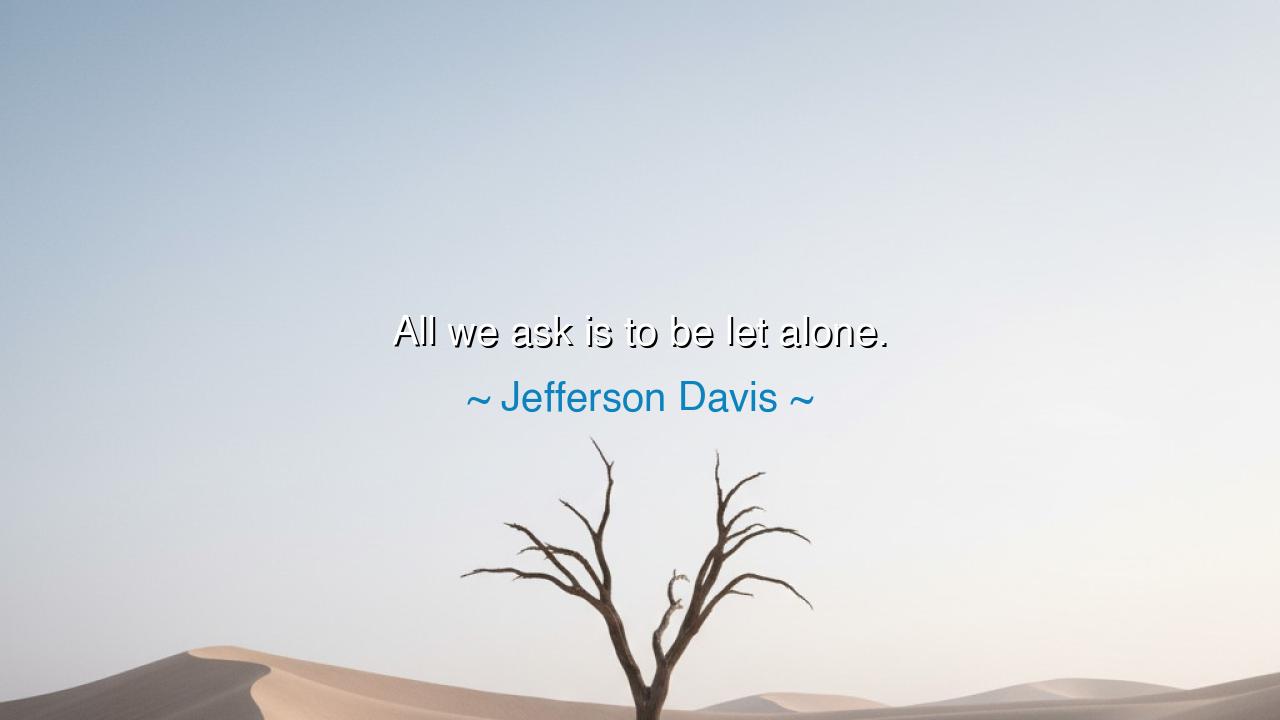
All we ask is to be let alone.






In the solemn and defiant words of Jefferson Davis, President of the Confederate States during the American Civil War, we hear this haunting declaration: “All we ask is to be let alone.” These words, spoken in the early days of 1861, were more than a plea—they were a creed, a cry born from conviction and illusion alike. To some, it was the voice of liberty resisting domination; to others, the mask of injustice defending its power. Yet whatever side of history one stands upon, the phrase resounds with timeless meaning, for it speaks to one of the deepest yearnings of the human heart—the desire for self-determination, for the right to live according to one’s own law, free from the hand of compulsion.
Jefferson Davis uttered these words on April 29, 1861, before the Confederate Congress in Montgomery, Alabama. The storm of war had begun to gather; the Union was breaking apart. Davis stood not merely as a politician, but as the embodiment of a people who believed their way of life, their autonomy, and their sovereignty were under siege. When he said, “All we ask is to be let alone,” he spoke to the South’s vision of independence, invoking the spirit of the American Revolution—the same spirit that had once defied the British crown. Yet beneath his words lay a darker truth, for the freedom he demanded was bound to the institution of slavery, the enslavement of others’ freedom. Thus his plea, noble in tone, was poisoned in its foundation, revealing the tragic paradox of human liberty when sought at the expense of another’s soul.
And yet, beyond the weight of its history, Davis’s quote reveals an eternal conflict that has lived in every age—the struggle between independence and unity, between the rights of the individual and the claims of the collective. The cry “let me be” echoes not only through the chambers of politics but through the corridors of the human spirit. Every person, every people, at some hour of oppression, has uttered a similar plea. It was the cry of Moses before Pharaoh: “Let my people go.” It was the murmur of the colonists before King George, the whisper of peasants beneath the tyrants of Europe, the shout of nations breaking their chains. And yet, the wisdom of ages teaches us this: liberty untempered by justice becomes tyranny, and justice without freedom becomes despotism. The balance between the two is the narrow path upon which all great civilizations must walk.
The story of Jefferson Davis thus becomes not only an episode in the history of America but a parable for humanity. His demand—to be left alone—was sincere, but it ignored the moral wound at the heart of his cause. The South sought independence, but not equality; freedom for itself, but bondage for others. Nature, however, does not allow such contradictions to stand. The world itself is bound by moral law, and when one people’s liberty is built upon another’s chains, the order of creation demands correction. Thus came the terrible reckoning of the Civil War—a baptism of blood through which the nation would be reborn. The price of misunderstanding freedom was measured in suffering beyond measure, and through that trial, America learned that true liberty cannot be partial—it must be shared, or it will devour itself.
Yet even in the ashes of history, the echo of Davis’s words retains meaning for our own lives. For in every heart lies a yearning “to be let alone”—to live without intrusion, to follow one’s conscience, to find peace away from the noise of the world. In this sense, his words speak to the dignity of solitude and the sacred right to privacy. Each human being is a small nation of thoughts and dreams, deserving of space to govern itself. The danger arises only when this desire becomes isolation—when we demand separation not for the sake of peace, but out of pride or indifference to others’ suffering. For to be “let alone” in selfishness is to become a prisoner of one’s own walls; but to seek quiet in the service of truth is to find communion with the divine.
We may also hear in Davis’s words a warning for all leaders and nations: that power, even when born of noble intent, must never forget the human soul. A government that intrudes too deeply into the life of its people breeds rebellion; but a people who reject all shared duty invite chaos. The wisdom lies in balance—in knowing when to stand apart and when to stand together. Every age must rediscover this truth, for every generation faces its own struggle between liberty and order.
The lesson, then, is both historical and eternal: to seek freedom, but never without conscience; to cherish autonomy, but not to idolize it. The words of Jefferson Davis, though bound to a tragic cause, remind us of the sacred tension within the human condition—the need to belong and the need to be free. Let us take from his story not his blindness, but his fervor; not his division, but his devotion to principle. Let us strive to live in such a way that when we say, “let us be,” it is not to withdraw from justice, but to dwell in peace with all who share the earth.
So remember this, O listener of history: the cry “All we ask is to be let alone” may rise from every heart, but it is the duty of wisdom to ask—alone for what purpose? To escape the light, or to dwell within it? For freedom without truth is a desert, but freedom joined with righteousness is a garden watered by heaven itself.






AAdministratorAdministrator
Welcome, honored guests. Please leave a comment, we will respond soon